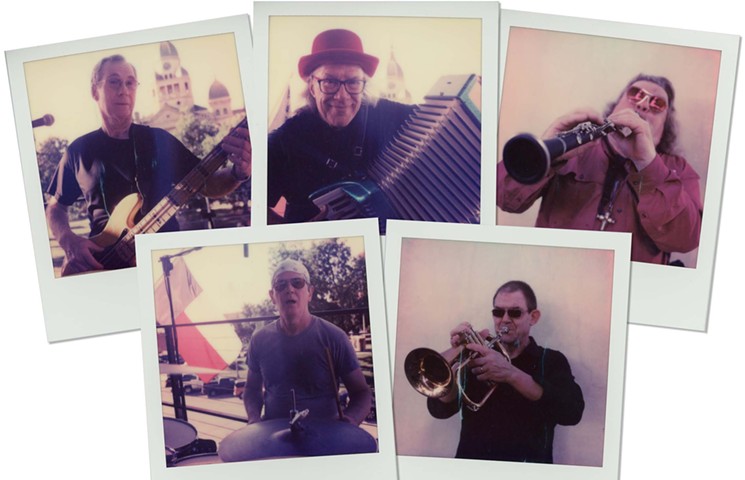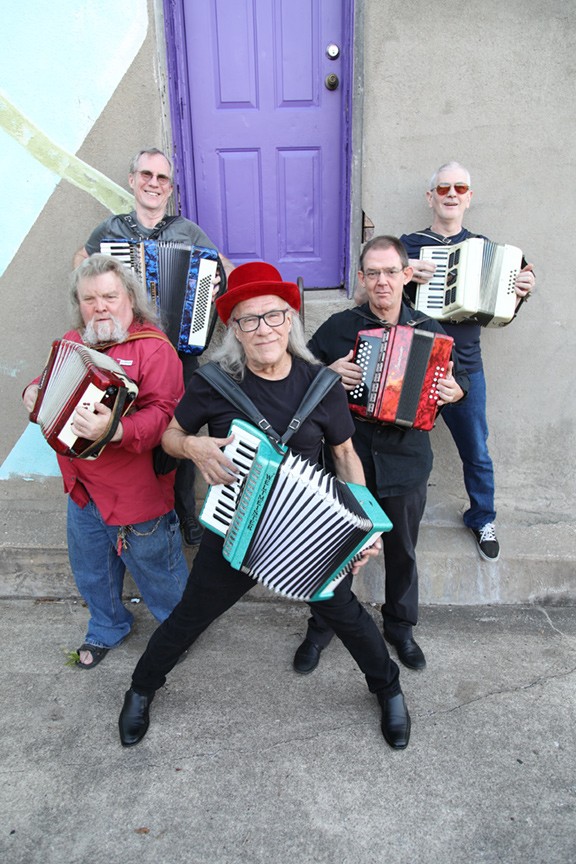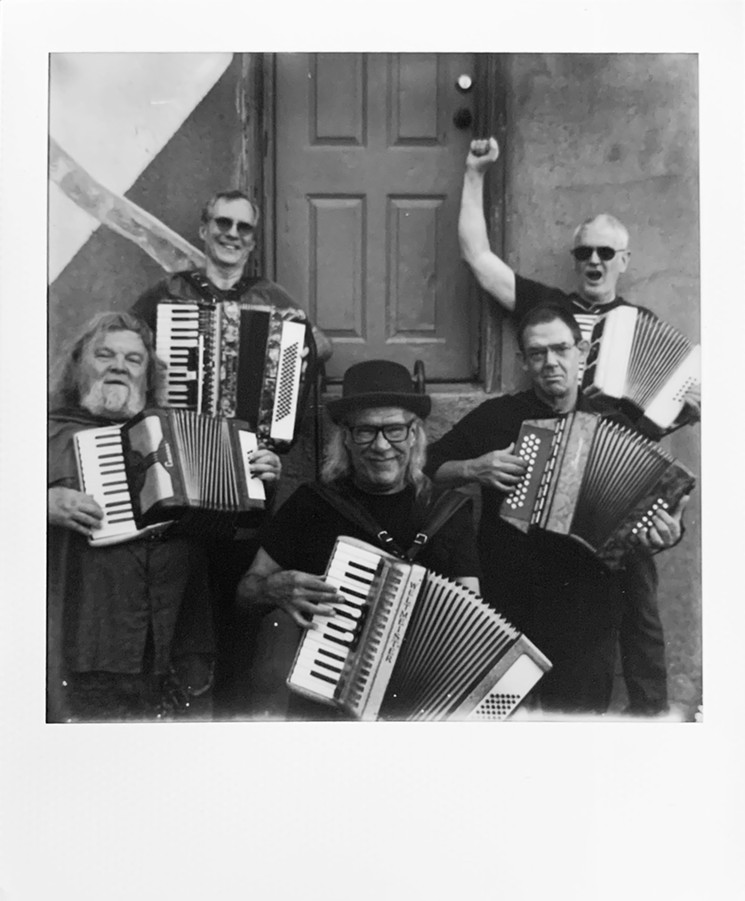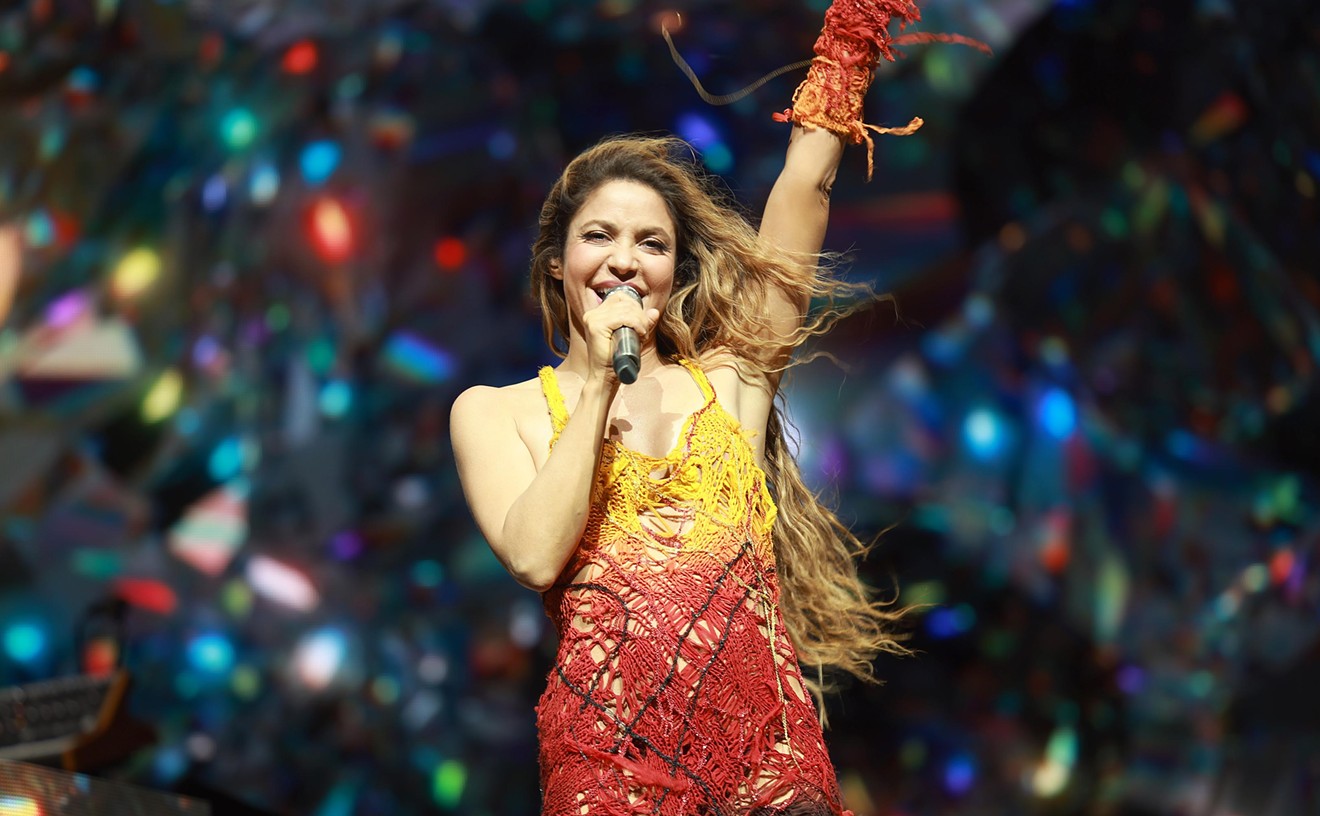It’s time to “Chicken Dance,” and as if Finch were the Pied Piper of Denton, the dancers don’t miss a beat as they instantly assume their positions — elbows cocked and up in wing position — for the beloved, playful tune.
Brave Combo is there to celebrate 40 years as the world’s favorite punk polka band. That would be an impressive run for any band. It’s an amazing one for a group that you might dismiss as a novelty act, if you’ve never heard Brave Combo play. In fact, Brave Combo is one of the best-known bands to step out of North Texas onto the world stage. Their fans include Talking Heads’ David Byrne, and no one less than Bob Dylan has covered one of their songs.
While a Denton rooftop isn’t exactly Carnegie Hall, it is ground zero for a group of serious musicians who celebrate and honor world music. There’s more to them than accordions, lederhosen and the Bohemian dance. Brave Combo’s set lists include an assortment of musical styles able to win over rowdy crowds at both punk bars and Czech fests. The combo embraces danceable styles of music from across the globe, including conjunto, cumbia, zydeco, salsa, merengue, norteño and ska, which allows them to regularly play, and often headline, jazz, polka or rock festivals, as well as seasonal events like Oktoberfest and Christmas gatherings.
It took a lot of guts 40 years ago for a group of young musicians from Denton to walk into punk venues and cut loose with blazing polka tunes. In Donald Trump’s America, openly celebrating immigrants might take more, as Brave Combo recently found out.
Nuclear Option
The polka originated in the mid-19th century in Bohemia, now part of the Czech Republic, first as a dance and then as a genre of music that became popular across Europe before being brought to the Americas by immigrants.In the early days, the band faced the occasional heckler, walkouts and the like caused by a polka band playing rock clubs, and some polka traditionalists weren’t keen on their brand of rocked-up polka, which the band dubbed “nuclear polka.”
“You gotta remember, we immediately caught on as a wedding band. And we could make money." — Tim Walsh
tweet this
Purists be damned, though. Nuclear polka was a hit with more open-minded rockers and polka fans. In fact, it was such a hit that the band would go on to win Grammy Awards, open for Taj Mahal and Sonic Youth, play at Byrne’s wedding and appear as yellow-skinned, lederhosen-wearing versions of themselves on The Simpsons. And the oompahs keep on coming: In the next two months alone, the band has gigs booked in St. Louis, Nebraska, Nashville and an annual mid-December Christmas show in Chicago.
But as the band recently found out, and as the Dixie Chicks might have told them, blending modern and traditional styles can win artists lots of fans. Toss some politics into the mix, though, and fan love can quickly sour. The Dixie Chicks, another North Texas musical powerhouse, saw their careers take a hit after they criticized President George W. Bush. For Brave Combo, the turn came when the band chose to say nice things about the immigrants who brought America the music that made the band famous.
Amid all the rancorous rhetoric over immigration and immigrants' rights in the Trump administration, Finch & Co. chose to share their take on the issue with several “Immigrant Songs” concerts, riffing on Led Zeppelin’s hit single “Immigrant Song.” With stories and statements at concerts, the band talked about the origins of many of the songs and styles they play. Finch says some fans scolded them, and a few longtime fans removed their names from the group’s mailing list. Others said they’d boycott the combo’s concerts. Instead of backing down, Finch says he’s planning to put together “Immigrant Songs II.”
While Brave Combo plays styles originating from as close as Mexico and other South American countries, many numbers have roots in the Czech Republic, Poland, Germany, Eastern Europe and the Middle East. Those musical styles wound up evolving further when the immigrants were absorbed into the melting pot of American musical communities and traditions.
As Finch explains it, after those European polkas arrived in Mexico more than a century ago, those traditional styles eventually transformed into the accordion-driven conjunto, norteño and Tejano music familiar today. Later, here in the states, traditional polkas collided with big city jazz and big band beats to create different genres altogether.
Even before the band had a name, Brave Combo had directly benefited from the flow of immigrants into the United States. Without immigrants, their songs and records, Brave Combo’s music simply wouldn’t exist. It would be ungracious not to say thanks for that, but then being ungracious toward immigrants is the fashion these days.

Brave Combo members Lyle Atkinson (left), Carl Finch (center), Jeffrey Barnes (right), Alan Emert (bottom left) and Danny O’Brien (bottom right)
Daniel Rodrigue
Schoolmates to Bandmates
Finch formed Brave Combo near the end of the spring 1979 semester with three other North Texas State University (now UNT) students. After gigging hard all summer together with rapidly growing support throughout North Texas, Finch, Lyle Atkinson, Tim Walsh and Dave “Tito” Cameron (now, after gender transition, Austin’s well-known drummer Lisa Cameron) decided to turn Brave Combo and their self-labeled “nuclear polka” into a full-time endeavor.“You gotta remember, we immediately caught on as a wedding band,” Walsh explains. “And we could make money. By the end of that first summer, everybody was going, ‘Well, we really got something here.’ I think everybody quit their jobs except for Lyle, who was managing [JCPenney].”
Finch’s first exposure to polka came in the late ’60s when a boyhood friend’s father played polka eight-tracks while driving around Texarkana, where Finch was born and reared before moving to Denton for college.
About a decade after he heard those eight-tracks, a distributor unloaded a wide assortment of polka records at a five-and-dime store in downtown Texarkana. Finch wandered into the shop, and the albums’ covers caught his eye. “They were like 50 cents each or something, and I bought a ton of them because the jackets intrigued me,” Finch says, recounting that pivotal day when he first examined Larry Chesky’s Big Band Polkas and so many other records by Andrew Walter, Al “Cocoa” Czelusniak and more that the earliest members of the combo learned to play from.
“They were odd, and a bit out of place, but so were nearly all the other bands." — Frank Campagna
tweet this
By spring ’79, Finch promised in an interview with an underground art publication to form a “nuclear polka band.”
“For us, everything is sacred and nothing is sacred,” Finch explains about the band’s approach. When Brave Combo started in ’79, disco was thriving, and Finch says he couldn’t stand what rock had become, so they turned to polka and other ethnic music as a rebellion against commercial music.
“We wanted to come up with the squarest word for group at the time. Like your parents may ask, ‘How are things going with your combo?’” Finch says. “And then we were brave because we were taking music, we’re going to be playing music that wasn’t appropriate for the venues. And we were going to be putting ourselves in danger.”
Where No Polka Had Gone Before
After playing venues across Denton and Fort Worth and heading out on a tour, Brave Combo played the group’s first of many shows at DJ’s on Lower Greenville Avenue on April 13, 1980. DJ’s catered to a country crowd before proprietor Dolores Nolley saw a more lucrative path in hosting Dallas’ underground and punk communities. A bathtub filled with beer and ice served as the bar, and they reused plastic cups for setups.Artist, muralist and Kettle Art founder Frank Campagna often designed promotional flyers for DJ’s, and he recalls the first few times Brave Combo played there. “They were odd, and a bit out of place, but so were nearly all the other bands,” Campagna says. “What was great about that era was everyone who went there was looking for something new, different and original.
“Even then they had a following that loved them.”
Texas music writer and critic Joe Nick Patoski says Brave Combo could “get the punks out on the dance floor.” For over four decades, Patoski covered the Lone Star State’s far-flung music scenes, as a former senior editor for Texas Monthly and a reporter for the Austin American-Statesman.
“I met Carl at DJ’s, which was really the first punk club in Dallas,” he recalls. The band soon met with Patoski at The Bottom Line in Austin while opening for Joe “King” Carrasco. In perhaps one of the most important leap-of-faith decisions the band ever made, the combo said yes when Patoski offered them their first opening gig in New York on July 19, 1980. Finch says they jumped at the chance without having a tour van or a plan at all.
“It was doing what they were doing in Texas that got people’s attention,” Patoski says. “It was getting out of Texas that made them.”
The night Brave Combo played its first show in New York, none other than famed critic Lester Bangs was in the front row. From then on Bangs frequently mentioned Finch and Brave Combo in The Village Voice.
From Tents to Dance Halls
After seeing a billboard for Westfest on the way back from a gig in Austin, Walsh picked up a phone and cold-called the organizers hoping to book Brave Combo’s first show in front of a true polka crowd at the Czech festival. (Another cold-call by Finch once landed the band in the Macy’s Thanksgiving Day Parade.)“They said: ‘Do whatever you want. We’re not paying ya. You can come and play, and we’ll pass the hat,’” Walsh says.
“And of course it went over big,” Walsh says. “They came back and said, ‘What’ll it take to keep you playing?’” One of the organizers whipped out a checkbook on the spot, writing the band a $100 check to play an extra two hours. Walsh wrote in his gig diary: “And when it got time to quit they wouldn’t let us stop. Someone passed the hat and we played another hour. A lot of dancing. We had more free beer than we could possibly drink.”
Heading home to Denton with nearly $200 and their bellies full of beer and kolaches, the band’s 39th gig proved to be the highest-paying non-wedding performance to date. “We killed it,” Cameron recalls of that first concert. “And the next year we came it was bigger, and the third time we came it was like a rock star thing.”
Brave Combo quickly went from playing side tents with dirt floors to headlining main stages with massive hardwood dance floors. By their third Westfest, the band’s paycheck had jumped to $300, and Walsh’s diary mentions they made “a huge crowd happy, many of whom were there just to hear us.” By the end of the Sunday show that third time in West, the dance floor was a screaming, dancing horde, and the band sold 48 records. Walsh’s fourth and final Westfest with the band made $1,000 and played the coveted 4 to 8 p.m. slot on Saturday and Sunday.
Walsh left the band in 1983. “I told the guys, when I did, it was one of my excuses that I never set out to be a professional sax player,” Walsh says. “I mean, when I was a kid, I thought it was a real grind. And there was no time for anything else. There’s no vacations or anything like that — especially back then.”
“It’s definitely an unusual band,” Cameron says. “Not a band like any other. We would do weird things like play a polka festival in the morning, and then go to play a dinner club, supper club, and then go play a punk rock club in Dallas, all in the same day. And that’s nothing I’ve ever seen any other band do.”
Busy, Busy, Busy
In addition to all the gigging and practicing, the combo kept themselves busy planning and promoting. “It was a big education for both Carl and I, because we were working to book the band full time,” Walsh says. “And just learning how to manage a business and keep things going, well, they don’t teach you that in music or art school, so you have to figure that out. And if you’re being an entrepreneur and going to the post office every day and following up on calls, keeping lists, executing the lists, rehearsing the band, it turns into a full-time job very quickly.”All that early hustle paid off. Some bands struggle for years before earning ink in Rolling Stone. For Brave Combo it took a few months. “In the early days, we got a lot of press,” Cameron says. Almost out of the gate the band garnered attention for polka versions of “Purple Haze” and The Who’s “I Can See for Miles.” “I do think that Carl is a marketing genius. Because nobody would’ve ever heard of us. And there we were in Rolling Stone, ‘There’s this band in Texas who does a Jimi Hendrix polka.’ And it’s got our picture there in the Random Notes. It blew my mind. I couldn’t believe it.”
Finch says he realized early on the band should remain in Denton. “We figured out how long it takes to drive to New York or L.A. or Seattle or Miami,” he says, glancing over his shoulder at a map pinned to the wall in the combo’s office, practice space and de facto museum. “We know how long it takes to fly there, and we know how long it takes to drive there. If you move to either coast, that other coast is horribly far away.”
And North Texas is lucky Finch stayed, as he and the combo have left an indelible impact on the North Texas music scene.
Award-winning singer-songwriter, multi-instrumentalist and radio show host J. Paul Slavens says Brave Combo was the first band he saw after moving to Denton in 1984 from Sioux City, Iowa. “I was fresh from the cornfields and had no idea that you could do what they did,” he recalls of that concert at Rock Bottom Lounge in the NTSU Union Building. “I’m not lying when I say that night changed my life.” Slavens fronts the longtime locally popular jazz-rock act Ten Hands.
True Stories
Life-changing events were soon in store for Brave Combo, too, starting with David Byrne.“Two weeks before I met David Byrne the first time — two weeks,” Finch says emphasizing how quickly the stars aligned in 1985, when he was introduced to Byrne at the Stoneleigh P by an associate. “I was looking at, man, ‘How can we get into the mainstream?’ There’s only two big-time, mainstream performers I know of who openly talk about how much they draw from other cultures: David Byrne and Paul Simon.
“And within two weeks, I was sitting having a meeting with David Byrne, and I was thinking this needs to happen. This is the person. It has to be this person. This is someone who can help move us to that next place.”
"If you notice in October nearly every town is adding an Oktoberfest. Well, all those towns need polka bands." — Carl Finch
tweet this
The next place was still Texas, but on film, as Byrne tapped Finch to help scout talent for his 1986 Texas-based film True Stories and to wear the “brick suit” in the comedy’s fashion show scene.
Then came the Grammy Awards. Frankie Yankovic danced home with the first polka Grammy presented in 1986, and Brave Combo won the best polka album Grammy in 1999 and 2004 before the Recording Academy, which presents the awards, eliminated the polka category in 2009, saying the cut was designed “to ensure the awards process remains representative of the current musical landscape.”
Though the Grammy Awards, never really that “representative of the current musical landscape,” abandoned polka, the dancing continued. In September 2016, during the 48th annual International Polka Association Polka Festival and Convention in Buffalo, New York, an academy of 180 electors from across the U.S. deemed Finch worthy of induction to the IPA’s Polka Hall of Fame.
It was a well-earned award for the man and band who have kept polka alive in the landscape over 40 years and through numerous changes in lineup. Onstage for the 40th anniversary concert, the current septet included Finch on lead vocals, keyboards and accordion, and Atkinson on bass guitar. When the band needs more oompah-pah, Atkinson plays tuba.
Finch remains the only original member who never left; Atkinson spent 1979 to ’85 in the combo, returning in 2015 after bassist Steve Carter left the band in 2014 to devote more time to his own band, Little Jack Melody and his Young Turks. Jeffrey Barnes joined the combo in ’83, playing saxophone, clarinet, flute, penny whistle, harmonica and more. Although he formally left the band in 2015, he often still finds time to make gigs and rehearsals.
Also onstage, Danny O’Brien, who joined in ’93, on trumpet, and Alan Emert on drums. Emert first joined in ’97, then left in 2008 before returning in 2010. In town from L.A. for the gig was youngest member Robert Hokamp on electric guitar. O’Brien, Emert and Hokamp are also members of the fantastic Herb Alpert & the Tijuana Brass cover band, A Taste of Herb. Brave Combo has seen a rotating cast of around a dozen regular members come and go over the decades, and depending on players’ schedules, fans may show up to catch a quartet, quintet or a sextet.
This weekend, the band plays sets on Saturday and Sunday, Aug. 31-Sept. 1, of Westfest in West. They’ve also booked several local Oktoberfests this fall, coming full circle at UNT’s Oktoberfest.
As for the future of polka in the U.S., Finch encourages young bands to pay attention to recent trends. “If I were a young musician and I liked polka music at all, I’m telling you, the future’s only looking brighter. If you could get a hot polka band together, you could work two months of the year and sit around the rest of the year.
Brave Combo could use help spreading the polka message, thanks to its own success. Event planners who want to hire them for an Oktoberfest performance will have to wait until 2021. The band’s calendar is fully booked for 2019 and full every Thursday, Friday, Saturday and Sunday of September, October and even through the first week of November through 2020.
“Have you noticed a lot of breweries opening up?” Finch says. “Have you noticed there’s a lot of craft beer going on? And if you notice in October nearly every town is adding an Oktoberfest. Well, all those towns need polka bands. So, suddenly, September and October — and I wouldn’t have predicted this — it has become like a gold mine!”













